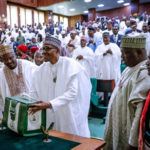RECENTLY, the Kano Kano State Hisbah Board seized and destroyed more than 30 trailer loads of beer enroute their retail points. According to its Public Relations Officer, Adamu Yahaya, the cartons were destroyed upon their interception at Kalebawa on Danbata Road in Dawakin Tofa area. “The Kano State Law No. 4 of 2004 has banned the manufacture and use of intoxicants in the state. Furthermore, an order was given by a magistrates’ court for us to go ahead with the exercise,” Yahaya said, warning sellers of beer to stay within their limits. Media reports further said that the destroyed beer were worth N150 million.
PDP rejects Zakari as INEC presidential election collation head, says ‘she is Buhari’s niece’
There is no doubting the fact that the Kano State government, by promulgating the State Hisbah Board, had in mind the need to protect religious sensibilities. This was apparently the basis on which the anti-alcohol law was brought into operation. However, the destruction of drinks of that magnitude, merely on the basis of religious sensibilities, raises serious questions about the Nigerian state and the wellbeing of all who live within its borders, their creed or faith notwithstanding. By the provisions of the Kano State Law No. 4 of 2004, the sale of alcohol and its consumption within the metropolis are prohibited. While we have no problem with this provision, we do have queries for a faith-based law which does not adequately provide for those who do not share the tenets of that faith. For instance, how does the Kano State government and its Hisbah Board factor in those who do not subscribe to its disdain for the consumption of alcohol, operating within the confines of the globally guaranteed freedom of association?
Tellingly, the drinks were seized en route the designated places where the Hisbah board allows for the consumption of alcohol. Just how could the vehicles have got to their designated places if they had not taken the route on which they were intercepted? You do not legislate minorities and their rights out of existence. Just how does conveying a consignment of beer on the road amount to an offence when there are no designated routes for such vehicles to ply while embarking on the journey? Catching and destroying consignments which haven’t been delivered is against reason, except where the government has provided a designated road for that purpose.
It is apparent that the law which sanctions such flagrant destruction of beer without taking into consideration the economy of the people doing such a legitimate business needs to be reviewed. If indeed Kano State and any other state that harbours alcohol use are part of Nigeria, they cannot be allowed to segment themselves from the rest of Nigeria. It is apparent that this law does violence to commerce, and to the spirit of secularity which the Nigerian constitution professes. The law needs urgent review, particularly because of those Kano residents whose faith permits beer consumption. They should be factored into the consideration of the Kano State government because they also have rights that need to be protected.
In any case, the economic sense in destroying beer worth N150 million leaves so much to be desired. More instructively is the question of what happens to the economic pool that provides value added tax (VAT) to the federal purse. All states of the federation collect the proceeds of VAT. These are proceeds from beer, cigarettes and many more which the faiths of some sections of the country frown at. Thus, we think that those whose faiths frown at these products should also follow the logic to its natural conclusion by not partaking in the sharing of proceeds from them. There seems to be some incongruence in collecting VAT and excise duties on beer, yet destroying beer and alcohol products which constitute a major hub of VAT proceeds.
Simply put, the society must provide for those who drink beer and those who don’t. It is apparent that the Kano State government and its Hisbah Board do not think that the rights and faiths of alcohol users matter at all. If they did, they would not treat them with such ignominy in the process of exercising their freedom to consume something that the supreme law of the land is clearly not at variance with. The law of the federation gives every Nigerian the right to dignity and association, so long as that right does not infringe on the rights of others. The Kano Hisbah Board and its anti-alcohol rules, especially the process of ferrying the drinks to their ultimate consumers, assaults the faiths of those who consume alcohol.
If anyone is against beer, they should be resolutely opposed to the collection of proceeds from beer. If they do not frown at the proceeds of alcohol, they should do no further damage to the country’s economy by impeding cash inflows into the general pool. While categorically delinking themselves from the proceeds of alcohol, they should advocate the disaggregation of the VAT money, so that, ab initio, the money they spend would not be contaminated with alcohol money. Their right to refrain from money that has any aroma of alcohol must be respected. This is why the Kano State Law No. 4 of 2004 needs to be tested in the superior courts for a clear-cut pronouncement on its justiciability with regard to the supreme law of the land.





